- Home
- Daniel Quinn
The Story of B Page 23
The Story of B Read online
Page 23
I talked to half a dozen people with first names approximately Michael and last names approximately Dershinsky and have dozens more to try as far north as Hamburg and as far south as Hannover, and if I want to try as far east as Berlin, I should be able to keep busy through Columbus Day.
It’s now eight P.M., and I’m running on three cylinders. All I can do at this point is stay awake long enough to reset my biological clock to local time.
In truth, I’m not exactly sure what I’m doing here. I suppose I’m here to prove that Herr Reichmann and Heinz Teitel are wrong, the inner circle is not gone—but I don’t know how to go about it. I can’t seriously expect city officials to dig up a million tons of rubble to prove something they already believe to be true. What then? The Teitels aren’t going to be any more helpful in person than they were over the phone. Can I imagine myself persuading the guardians at Shirin’s clinic that I’m a close friend who should be given her address and phone number even though I don’t know her last name? No, frankly I can’t. Of course, I can just plant myself on the front steps of the place and see if she shows up someday.
For the moment I can’t think of anything else useful to do. For the moment I’m too jet-lagged to think at all.
Wednesday, June 5
Plastic death
This morning I found myself a money machine, shoved in my plastic, and learned that I’d ceased to exist. My card had been revoked and was fresh out of magic. I considered myself lucky. They could’ve been a day quicker, in which case the card wouldn’t have passed muster at the hotel.
I had a couple of choices. I could cash in my return plane ticket or I could call home and ask my mother for a loan. I decided to cash in the plane ticket. I then had to think about my position with the hotel. As long as I didn’t try to use the card again there, I figured I was okay, and the hotel would not get stiffed, since the card was still valid when I checked in. Presumably the Laurentians would get stuck with the bill, which did not tax my delicate conscience at all.
Since the airline has no office in Radenau, I’d have to make a trip to Hamburg, which I decided to get out of the way. I made it back by six o’clock, looking forward to dinner, having missed lunch. As I was heading up to my room to rinse off, the clerk called me over to inform me that my card hadn’t passed muster after all. I not only owed them for one day, I owed them for two, having missed today’s checkout deadline by several hours—and of course I was going to be a cash customer from now on if I wanted to stay past tomorrow morning. I shoved nearly half my resources across the counter and told him I’d think it over.
Yeah.
Saturday, June 8
Walkabout
So at eleven Thursday morning I joined the ranks of the homeless, my worldly goods in a plastic bag. I stopped at a cafe for a croissant and coffee while I wondered what to do with myself. I thought later I’d look for a cheap pension or maybe just a pleasant bench in the park.
I went to the site of the theater. It was uncannily tidy, smartly fenced off to a height well over two meters. The buildings around it were perfectly unscathed. A demolition contractor could have demanded a bonus for a job done this neatly. The top of the iron spiral staircase was sticking up out of the rubble like the mast of a sinking schooner. The total experience wasn’t inspirational or educational or anything. I stood there looking through the fence for about five minutes, then left.
I paid a visit to Gustl Meyer’s shop of exotic leftovers. He was polite, even sympathetic, but had no suggestions.
I spent the afternoon at the library finding new ways to spell Michael and Dershinsky. I decided to take my list of numbers to Gustl Meyer’s shop on the morrow to see if he’d let me use his phone.
I returned to the hotel to see if anyone had responded to my advertisement. No one had.
I lingered over a pizza and a beer till it was quite dark. Then I started walking. This time I didn’t know where I was going except in a general way. I have a pretty good sense of direction, but if I didn’t find what I was looking for the first time out, so what. Time was one commodity I had plenty of.
I walked and walked, on feet already sore, and the sights and smells began to come back to me. As the social and economic atmosphere went down the scale, my spirits went up. I was heading into Radenau’s grimiest neighborhood, the domain of factories, machine shops, brickyards, and warehouses, inhabited at this hour only by night watchmen and guard dogs. Before long, I spotted a small, nondescript building just ahead, a sort of shed between a warehouse and a railroad yard, and I headed for it hoping the door would open, and it did, giving me a double lungful of cigarette smoke, booze, and “La Vie en Rose.” It was Little Bohemia, and by God it felt like home.
Albrecht
I made my way to a table at the back—all the way to the back, against a wall solid with framed drawings and prints, not one of them straight, not one of them with a piece of glass that had been cleaned in twenty years. At eye level when I sat down was a faded sketch of Igor Stravinsky that appeared to be signed by Picasso. Elsewhere it looked like nobody had moved since Charles and I had left three weeks before.
When the waitress came over to see what I wanted, I asked her if her name was really Theda.
“It really is,” she said with a smile. “Are you drinking Lagavulin tonight?”
“I’m drinking your cheapest rotgut, please, Theda,” I told her politely, but when it came, a couple minutes later, it tasted just like Lagavulin to me.
Someone spoke at my elbow and I looked up into a distantly familiar face. It was Albrecht, he of the giant intellect, the smirking twenty-year-old Englishman who volunteered to dump me in a lake the first time I visited the sub-sub-subbasement in the theater.
I said, “What?”
He said, sneering, “Are you B now?”
I thought about this some. I’ve never had much opportunity to learn how to deal with hostile people—some priests do and some don’t—but I feel like I must know the ABCs of it. I said to him, “Why don’t you sit down and tell me what’s on your mind.”
“Is the question too difficult for you?”
“Yes, it is,” I told him. With a triumph already in hand, he took a seat across from me. I said, “Why do you ask me this question?”
“You were being groomed, weren’t you? Isn’t that the word—‘groomed’?”
“Well, there is certainly such a word, but no one ever told me I was being groomed.”
He shrugged contemptuously.
“I’ve abandoned the priesthood,” I told him. This got a blink. “When I spoke with the man who originally sent me here, Fr. Lulfre, I told him that killing B had been a wasted effort, because B is still here—in the person of me—but I certainly don’t think I’m ready to begin where Shirin left off. And, by the way, I’ve deposited a tape of that conversation with a friend, otherwise I’d be a hunted man, possibly even a dead man by now.” This got three blinks in a rapid succession. I asked him if this answered his question—probably a mistake, since it seemed to put him back on track.
“Anyone can be hunted,” he said. “The question is, can you do what B did?”
“What exactly do you have in mind?”
“You took in their insights, but do you have any of your own? Are you a thinker and a teacher or just a reciter of Holy Writ? If all you can do is chant the scriptures, then you’re no more B than I am. You’re just an altar boy who has all the responses down pat.”
I downed some rotgut and wished this young whippersnapper was far, far away. Finally I said to him, “Albrecht, the past ten days have been a bit hectic for me, so it’s absolutely true that I haven’t added a single word to the teachings of B. Whether I can or not is another matter. Be that as it may, you’re absolutely right. If all I can do is chant the Holy Writ as I heard it from Charles and Shirin, then I’m no more than an altar boy.”
Albrecht smirked. “But you don’t really think you are, do you.”
“I don’t really think I am, no, but
I haven’t had a chance to prove myself one way or the other.”
“Do you want a chance to prove yourself?”
What could I say to that? No?
The test
Albrecht said, “The people of our culture imagine that we invented technology, agriculture, law, and of course civilization, but we also take credit for less praiseworthy accomplishments. Can you think of some of those?”
“Well,” I said, “I suppose we take credit for things like poverty, crime, and discrimination along racial and social lines. What Shirin called ‘the suffering classes’ are certainly our invention. Political oppression. Mental illness.”
“You’re missing the biggest one of all, Father.”
“I’ve given up being father. Just call me Jared.”
“All right.”
“The biggest one of all would be … war.”
“Of course. War is far and away the greatest ill we’ve brought to the world, isn’t it?”
“Yes.”
Albrecht shook his head, disgusted. “You really are pathetic, Jared. You don’t even pause to doubt, to question what Mother Culture whispers in your ear. You remain a total captive of the Great Forgetting.”
“Listen, let’s just skip the name-calling for a while, okay? I don’t pretend to know everything Charles and Shirin knew—or even everything you know. You’re telling me what? That war was not our invention”
“That’s what I’m telling you. War is not a defect found only in our quirky, deranged culture. It’s found wherever human culture is found—in the past and in the present. The myth of the peaceable noble savage is exactly that, a myth.”
“Okay. So?”
Albrecht stood up. “You’re truly sad, Jared. Don’t let me hear that you’re calling yourself B in this city. If I do, I’ll come round and embarrass you, I promise you that.”
“Sit down. Please.” He sat. “Please understand that I don’t pretend to be historically or anthropologically knowledgeable. I will be, I hope, but right now I honestly don’t see the point you’re making.”
“Then why don’t you ask?”
“I ask.”
“The foundation thinkers of our culture imagined that human life began when our culture began, just a few thousand years ago. Therefore nothing could possibly be learned about human life beyond that point. Beyond that point was nothing but a vacancy. Thus they looked into the past and saw that Man had been born an agriculturalist and a civilization-builder. They thought this was Man’s nature and Man’s destiny—and this is what we teach our children. The human race was born to become precisely us. Isn’t that what we teach them?”
“Yes.”
“B has tried to show you the absurdity of this teaching by removing the obscuring lenses of the Great Forgetting. By showing you that what came before the birth of our culture was not a vacancy. By showing you that our culture was not born in an empty world, in a world devoid of religion and law. Religion and law extend back hundreds of thousands of years, perhaps even millions of years, to the very origins of human life.”
“I understand.”
“You do? You understand that religion and law extend back hundreds of thousands of years?”
“Yes.”
“Well, so does war, Jared. Explain.”
“Explain,” I repeated hopelessly.
“Is this just another sign of pur vicious nature, Jared? Is that the explanation? Do we just innately love to kill?”
“No.”
“Does that ‘no’ represent a profession of faith or a statement of fact?”
“At the moment it represents a profession of faith, but I hope to turn it into a statement of fact.”
“Fine. Do it. Take off the obscuring lenses of the Great Forgetting and explain—or for God’s sake stop calling yourself B. Go home to your cozy little parish and apologize for behaving so foolishly.”
I felt fear. Then I realized he couldn’t possibly expect me to accomplish such a feat on the spot … but he did. He said, “If you’d like to become B another time, Jared, then by all means say so. Tell me this is your ambition—someday to become B. Then please go home.”
“But surely even B couldn’t perform this miracle sitting in a tavern, without a single reference book, without even a general encyclopedia.”
“I’ll be your encyclopedia. Or if you want books on prehistoric warfare, I can have them here in half an hour.”
“So you already know the answer to your question.”
“No, not at all. The books were not written by people who think like B. They were written by people who in their heart of hearts believe that Man was divinely shaped to conquer and rule the world. They’re scandalized by prehistoric warfare. They don’t explain it, they lament it. They’re embarrassed, because the creature destined from all time to be the ruler of the world should have been finer, nobler, more angelic.”
“Yes, I see…. Am I right in assuming that prehistoric warfare was similar to the sort of warfare found among tribal peoples in modern times?”
He shook his head, disgusted. “Either you know how to take off the obscuring lenses or you don’t, Jared. Don’t expect me to do it for you. I’ll be on hand if you want to consult an encyclopedia, but don’t ask me to do your thinking for you.” He got up and moved to a table by himself on the other side of the room.
I was relieved. He was right: Either I knew how to take off the obscuring lenses or I didn’t, and it would be easier done in solitude than in company. I flagged down Theda and ordered another drink.
The point I’d been making with Albrecht was one that I’d never explored with either Charles or Shirin, though it was implicit in everything they said. How do we know that modern tribal peoples live the way ancient tribal peoples lived? B’s answer is this: The tribal lifestyle survived to the present moment because it works. What is extant in the world is what has endured, what is stable, what works. Failed experiments disappear, successful ones are repeated and repeated and repeated. It’s fatuous to suppose that hibernation is a recent innovation for bears—though there’s no way to prove that it isn’t; bears hibernate because this works. It’s similarly fatuous to suppose that migration is a recent innovation for birds—though again there’s no way to prove that it isn’t; birds migrate because this works. It’s fatuous to suppose that web-building is a recent innovation for spiders—though there’s no way to prove that it isn’t; spiders spin webs because this works.
If you go back in time a million years, you will not expect to find bears spinning webs, birds hibernating, and spiders migrating. Bears hibernate today very probably because hibernation worked for them a million years ago. Birds migrate today very probably because migration worked for them a million years ago. And spiders spin webs today very probably because spinning webs worked for them a million years ago. Because humans were not the object of a special creation but evolved in the bosom of the community of life with all the rest, this sort of reasoning applies to people as well as it does to bears, birds, and spiders. We know for a certainty that totalitarian agriculture is a recent innovation, but there’s no reason at all to suppose that the tribal lifestyle is a recent innovation. People live tribally in modern times very probably because living tribally worked for them a million years ago.
I asked myself what I knew about warfare in the nonhuman community. What I knew was this: The closest thing to warfare in the nonhuman community is all within species, not between species. Predation isn’t war. Birds aren’t at war with worms, frogs aren’t at war with mosquitoes, eagles aren’t at war with rabbits, lions aren’t at war with antelopes. Predators don’t do battle with their prey—they just eat them. When animals do battle, it’s always with members of their own species, for territory or mates, and no one despises them as morally flawed or dreams of a happier day when they’ll learn to live together like Thumper and Bambi.
When nonhuman animals battle, the winners generally take over the losers’ territory or mates. Tribal warfare doesn’t wor
k that way. (Albrecht confirmed this in his capacity as reference library.) Tribes living in a given area are more or less constantly in a state of low-level war with each other, but when Tribe X attacks Tribe Y, it doesn’t typically take over its territory or its mates; rather, after inflicting a certain amount of damage, it typically turns around and goes home. Before long, typically, Tribe Y returns the favor, attacking Tribe X, inflicting a certain amount of damage, then going home. This relation of more or less permanent low-level hostility between X and Y isn’t special. The same relation exists between X and Z and Y and Z—and these three have similarly hostile relations with the neighbors around them.
Characteristically, the people of these tribes don’t think of themselves as having “a problem” with their neighbors; characteristically, no one is “working for peace”; characteristically, no one thinks there’s anything wrong or reprehensible about this way of life. Also characteristically, the people of Tribe X don’t imagine that their life would be sweet if one day they went out and killed off all their neighbors; they know there are neighbors beyond their neighbors, and these distant neighbors would be no friendlier than their near ones. It’s in fact really not so bad. Years go by in which X doesn’t attack Y and Y doesn’t attack X, and in these years relations between them are typically very cordial.
The task of B is to ask, “What’s working here?” or “Why is this system so successful that it’s still around after hundreds of thousands of years?”
What’s working is that cultural identities and cultural borders are being preserved. When X attacks Y, it doesn’t annex it. It doesn’t destroy Y’s identity or erase its borders, it just inflicts a certain amount of damage, then turns around and goes home. It’s no different when Y attacks X. In other words, every attack serves as a demonstration and affirmation of identity to both sides: “We’re X and you’re Y, and here’s the border between us. We cross it at our risk, and you cross it at yours. We know you’re strong and healthy. Every once in a while, we’re going to make sure you know we’re strong and healthy too. We know that if we mess with you, we’ll suffer. We want you to know that if you mess with us, you’ll suffer too.”

 The Story of B
The Story of B A Newcomer's Guide to the Afterlife: On the Other Side Known Commonly as the Little Book
A Newcomer's Guide to the Afterlife: On the Other Side Known Commonly as the Little Book Ishmael: An Adventure of the Mind and Spirit
Ishmael: An Adventure of the Mind and Spirit CLONES: The Anthology
CLONES: The Anthology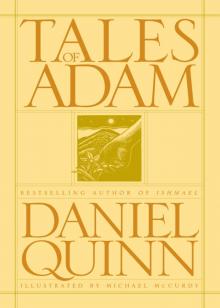 Tales of Adam
Tales of Adam The Holy
The Holy Dreamer
Dreamer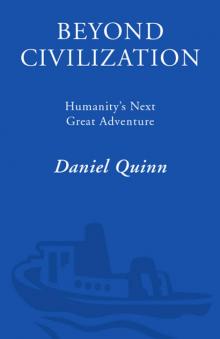 Beyond Civilization: Humanity's Next Great Adventure
Beyond Civilization: Humanity's Next Great Adventure After Dachau
After Dachau If They Give You Lined Paper, Write Sideways.
If They Give You Lined Paper, Write Sideways.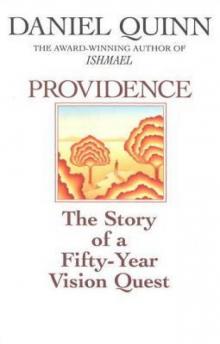 Providence
Providence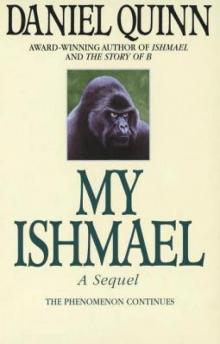 My Ishmael
My Ishmael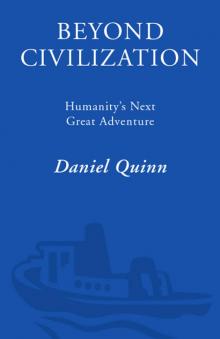 Beyond Civilization
Beyond Civilization If They Give You Lined Paper, Write Sideways
If They Give You Lined Paper, Write Sideways Ishmael
Ishmael Ishmael i-1
Ishmael i-1 A Newcomer's Guide to the Afterlife
A Newcomer's Guide to the Afterlife